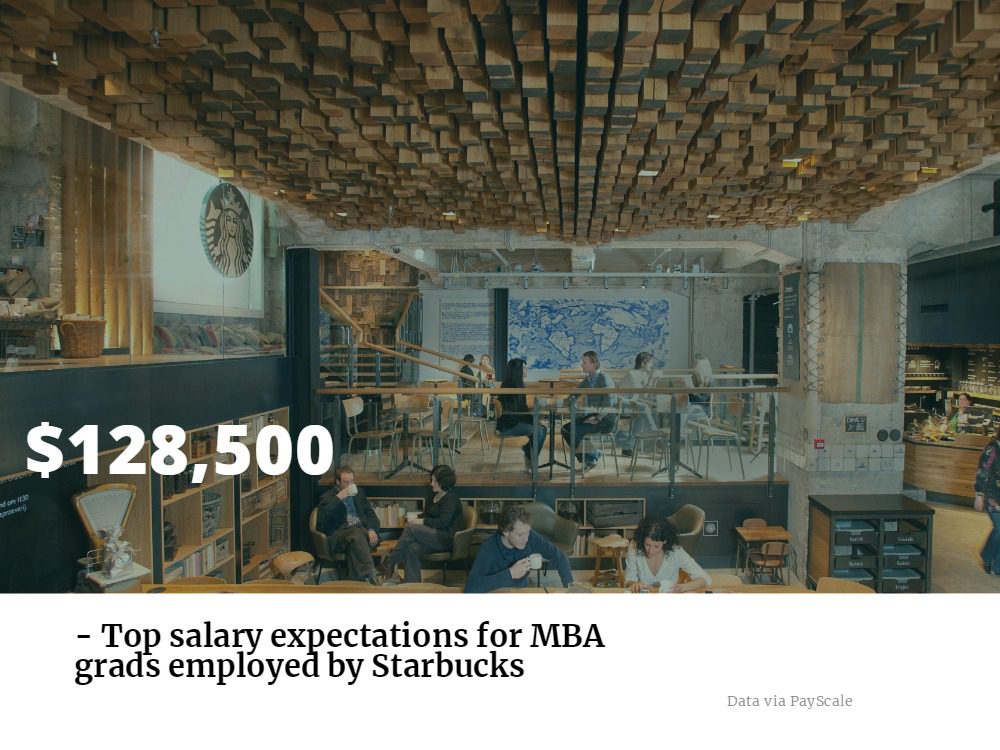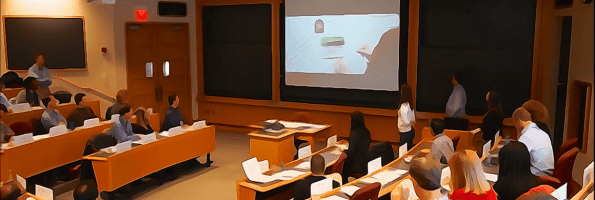Top MBA Recruiters: Starbucks

American coffee behemoth and casual status symbol Starbucks has become one of the most well-known companies in the world with over 27,000 stores and a massive headquarters located in Seattle, Washington. The company is known its quality service, customizable drinks, and pre-packaged items. As it continues to grow, so does the appeal for a Starbucks corporate career.
The company got its start in 1971 when the first store was opened in the Pacific Northwest. However, it wouldn’t be until 1987, when Howard Schultz took over and re-branded the company that they would open their first location outside of Seattle. By 1989, it had 46 stores and were roasting over two million pounds of coffee.
In 1992, Starbucks released its initial public offering (IPO) with a revenue of $73.5 million and a market value of $271 million. By the end of the year, the share price had risen over 100 times the earnings per share of the previous year. Now, the company earns more than $22.3 billion per year and employs over 238,000 people worldwide.
You can’t talk about Starbucks without talking about the location of its headquarters in Seattle. Located in the city’s SoDo neighborhood, Starbucks can be found in the largest multi-tenant building in the city with over 2,200,000 square feet of space. But while the building is impressive, it’s the city that really stands out.
Washington was ranked as “America’s Top State for Business in 2017,” by CNBC, and Seattle is the city to be in. According to Outside Magazine, Seattle is one “America’s Best Towns Ever,” and a PWC survey considers it one of the nation’s most innovative cities. There’s much to love about Seattle from its opportunities for adventure, laid-back culture, and strong economy, which grew 3.7 percent last year—almost 2.5 times the national average.
MBA Recruiting at Starbucks
Starbucks is a major MBA recruiter. It looks for MBA students who understand who Starbucks is as a company. As well, it recommends reading former CEO Howard Schultz’s book, Onward: How Starbucks Fought for Its Life without Losing Its Soul and following the company on social media including LinkedIn, Twitter, YouTube, and Instagram. The company wants to know why you want to be a part of it and how you fit in with the Starbucks Mission Statement.
Other required qualities include:
- Strong analytical and technical skills
- Ability to analyze business trends
- A strong team player who can collaborate cross-functionally
- Strong interpersonal skills
- Great communication skills orally and in writing
- Strong organizational and problem-solving abilities
- Ability to balance priorities and meet deadlines
You may also be required to have a deep understanding of financial planning, forecasting, and inventory management. You should also have a strong understanding of marketing fundamentals and be able to understand sales, return on investments, and profit and loss.
As for where Starbucks recruits, many MBA programs feed into the company including:
- The University of Washington Foster School of Business
- Dartmouth College’s Tuck School of Business
- The Wharton School at the University of Pennsylvania
- Arizona State University’s W. P. Carey School of Business
- The University of Michigan Ross School of Business
Salary & Benefits of Starbucks Employment
According to PayScale, MBAs hired at Starbucks are paid well:
- Master of Business Administration (MBA), Business Administration – $128,500
- Master of Business Administration (MBA), Accounting – $65,111
- Master of Business Administration (MBA), Marketing – $109,823
- Master of Business Administration (MBA), General Business – $89,000
- Master of Business Administration (MBA), Global Management – $77,419
As for benefits, Starbucks offers a tailored benefits package that’s called “Your Special Blend,” which includes Medical, Dental and Vision coverage as well as life insurance, disability, adoption assistance, paid vacation, a 401(k) Savings Plan, stock investment, one free pound of coffee per week, and more. There are also perks that include in-store merchandise discounts, matching gifts programs, etc.

Interning at Starbucks
Every year, Starbucks offers an exclusive ten-week internship program in Seattle that is designed to provide a robust and meaningful experience. MBA students who are chosen to participate can expect to participate in high-impact, business relevant projects that have well-defined goals and expectations. Interns also have access to mentorship and leadership opportunities. Graduate internship applications open from January to February each year for the summer program.
According to Peter Kazarian, a ’16 UW Foster MBA graduate who interned at Starbucks, the intern program is very deliberate and well laid out.
“With part MBAs and the rest technical and undergrad interns, there was a formal on-boarding program, weekly meetings with SVP/C-suite leadership, and great experiences like a Sounders game or fancy catered dinners at museums,” Kazarian explained in a blog. “My department was under the Channel Development arm of Starbucks, which included consumer packaged goods and anything else not in a Starbucks retail store, like grocery bottled fB2brappuccinos, licensed stores, and in my case, bulk B2B customers like airlines, hotel chains, restaurants, and campus cafes. As part of the Digital and Loyalty team, my main project involved e-commerce enhancements to our B2B team’s website, and forecasting new sales revenue and cost savings from these changes.”
As for what Kazarian enjoyed most about his experience, he enjoyed the free pound of coffee each week. He also loved getting to know his fellow MBAs who are now good friends of his. “I had a great experience … and I’ll be returning to Starbucks … as a Product Manager,” he said.
Starting a Business Straight Out of School? How HBS Supports Student Entrepreneurship

This coming weekend, Harvard Business School (HBS) will host an annual Entrepreneurship Conference sponsored by its own homegrown Entrepreneurship Club. The conference brings together hundreds of participants including “founders, joiners, and venture capitalists,” all of whom hope to connect through a smorgasbord of lectures, panels, chats, and networking sessions.
This year’s conference, scheduled for Saturday, March 31, is expected to draw more than 500 participants, including many top professors and professionals holding court on a variety of topics. Three keynote lectures will be given by CEOs and founders from Catalant Technologies, Strava, and edX. Strava’s Michael Horvath, who is also a professor of entrepreneurship at Dartmouth’s Tuck School of Business, will share his experiences having held several high-level roles at multiple startups.

Tuck Professor and Strava Co-Founder Michael Horvath will give one of the Entrepreneurship Conference’s keynote addresses.
In addition to the keynote lectures, the conference is also stacked with nine different panels. Some will include general discussions on topics such as starting a business during your MBA program and financing your startup. Others are more specific, covering some of the hottest fields in entrepreneurship right now. Examples of these include “Blockchain: The Next Transformative Technology?” and “AI/ML: Artificial Intelligence in Diverse Contexts.” Finally, attendees will also get to take part in a venture capitalist meet-and-greet and a networking lunch and cocktail hour.
HBS is extremely supportive of entrepreneurship, according to Jim Aisner, the school’s director of media and public relations. He spoke at length about the myriad ways in which HBS is a fantastic place for both seasoned and budding entrepreneurs, underscoring the range of support Harvard’s large entrepreneurial community offers to those looking to start their own businesses.
“Entrepreneurship is a major component of life at HBS, with some 35 faculty members doing research, course development, mentoring/advising, and teaching in this area,” Aisner told Clear Admit.
Harvard’s program requires all first-year MBA students to take an entrepreneurship course, and there are also a large number of entrepreneurial-focused electives on offer in the second-year Elective Curriculum. In addition, the school boasts multiple conferences and events that reach programs outside the business school. “There is a whole ecosystem [at Harvard] promoting and nurturing entrepreneurship,” Aisner notes.
Significant Programming Supports HBS Student Entrepreneurs
HBS is also home to the Arthur Rock Center Accelerator, which helps selected teams develop their ventures over the course of the year. In addition, the Rock Accelerator offers summer fellowships to support students from the entire student body who seek to develop entrepreneurial ventures during the summer and hosts a semiannual conference that brings 100 alumni back to campus each year.
Rock Venture Partners is a program that lets small groups of students learn more about investing in startups by supporting Rock Accelerator teams as they go through pitching and starting their ventures. Then there is the Harvard Innovation Lab, or i-lab, a resource available to current students at any Harvard school interested in exploring innovation and entrepreneurship at any stage. “The Innovation Lab creates a hotbed of cross fertilization for teams from across the university,” says Aisner.
Given this supportive environment, it won’t come as a shock that many HBS students decide to start their own businesses rather than pursue a more traditional career path in their post-MBA life. Out of more than 900 students, eight percent of graduates from the Class of 2017 chose to start their own businesses upon graduation, up from six percent in the Class of 2016. Although this growth is indicative of a national trend toward more and more recent MBA grads founding startups, HBS outperforms many top schools in this regard. By comparison, at Chicago Booth just 3.2 percent of 2017 MBA grads went immediately into running their own startups. Meanwhile, at the University of Pennsylvania’s Wharton School, just 2.3 percent of the most recent graduating class founded businesses.
As another indicator of its commitment to fostering entrepreneurship, HBS will host its annual New Venture Competition on April 18th, which bestows more than $300,000 in prize money to outstanding new ventures. Contestants may apply in either the business track, with ventures that drive substantial market value, or the social enterprise track, with ventures that drive social change. This recent Clear Admit article noted that the social enterprise track received 69 entries this year, more than ever before.
Nationwide, more and more students have begun to pursue startups at all stages of their MBA careers. From this weekend’s student-led Entrepreneurship Conference to the wide range of related centers, faculty, and other support, HBS’s investment in nurturing its entrepreneurial students is clear.
This article has been edited and republished with permissions from our sister site, Clear Admit.
The Future of Employment at Philly Business Schools

When considering where to get your MBA, one of the first questions you should ask is, “What will my employment outlook be?” After all, the reason you get an MBA is to improve your career. But what is important when it comes to employment trends at the leading business schools in Philadelphia? There are quite a few different statistics you should look at.
Important MBA Employment Statistics
To choose an MBA program based on your future career success, there are a few questions you need to answer.
- What industry do I want to work in and does the school place a majority of their students in that industry?
- What percentage of students receive and accept job offers? The same for internships?
- Self-employed or entrepreneurship data?
- What salary can I expect?
- Where do most students end up living and work?
- Who are the top employers?
You also want to look at any trends between years. For example, the percentage of students receiving job offers should increase year-over-year. And if you see a shift from the consulting industry to financial services, you want to be aware that the school could be changing its direction.
So, what does employment look like for three of the top Philly business schools?
The Wharton School
At the Wharton School at the University of Pennsylvania, the employment trends year-over-year are fairly consistent. While the percentage of students reporting job offers dropped from 2016 to 2017, part of that reason may be the increased number of students seeking employment (75.2 percent vs. 79.1 percent).
As for the increase in median salary, that can be attributed to inflation as well as an increase in job salary for each industry including professional services rising from $160,000 in 2016 to $180,000 in 2017. The location of jobs also changed slightly between 2016 and 2017, but that could be due to various reasons including the current state of international affairs for the U.S.
| The Wharton School | 2017 | 2016 |
|---|---|---|
| Percentage of students reporting job offers | 97.1 percent | 98.3 percent |
| Percentage of self-employed students or those starting their own business | 4.8 percent | 5.8 percent |
| Median Salary | $130,000 | $125,000 |
| Location Choices | 88.7 percent U.S. 11.3 percent International | 86.9 percent U.S. 13.1 percent International |
As for where MBA students at the Wharton School gain employment, there are a few important notes. The same top three industries—financial services, consulting, and technology—attracted students in both 2016 and 2017. However, the percentages were a little more evenly distributed in 2017. As for the companies hiring students, most of the same companies showed up each year.
| Top Three Industries | Percentage of Students (2017) | Percentage of Students (2016) | Companies Employing Two or More Students (2017) |
|---|---|---|---|
| Financial Services | 32.7 percent | 35.1 percent | Barclays, CITI, and HSBC |
| Consulting | 28.3 percent | 26.6 percent | A.T. Kearney, McKinsey & Company, and Boston Consulting Group |
| Technology | 16 percent | 12.6 percent | Adobe Systems, Amazon, and IBM |
Penn State Smeal College of Business
Pen State’s Smeal College of Business is consistent year-over-year in regards to its MBA employment trends. The percentage of student reporting and accepting job offers increased between 2016 and 2017 from 88.9 percent to 91.5 percent. However, the median salary stayed consistent at $105,000, and the hiring trend of most MBA students staying in the U.S. also remained the same.
| Penn State Smeal College of Business | 2017 | 2016 |
|---|---|---|
| Percentage of Students Reporting Job Offers | 91.5 percent | 88.9 percent |
| Median Salary | $105,000 | $105,000 |
| Location(s) | 98 percent U.S. 2 percent International | 96.5 percent U.S. 3.5 percent International |
As for where MBA students at Smeal College gain employment, there are a few important notes. While the same industries made the top four each year, where they placed changed. In 2016, the top industry was consulting (25 percent) while that changed to manufacturing in 2017 (20 percent). In 2017, retail also moved into tie consulting for the second most sought-after industry, while technology actually decreased year-over-year (23 percent vs. 15 percent).
| Top Four Industries | Percentage of Students (2017) | Percentage of Students (2016) | Companies Hiring |
|---|---|---|---|
| Consutling | 18.5 percent | 25 percent | Deloitte, EY, and PricewaterhouseCoopers |
| Technology | 15 percent | 23 percent | Amazon, Apple, and Dell |
| Manufacturing | 20 percent | 14 percent | Amphenol Corp, CHEP, International Inc. |
| Retail | 18.5 percent | 14 percent | Anheuser-Busch, Proctor & Gamble, and Johnson & Johnson |
Rutgers Business School, Camden
In 2017, the Financial Times ranked the Rutgers MBA as the best program for MBA employment across Big 10 schools. In 2016, Bloomberg Businessweek also ranked Rutgers as the best MBA program for job placement in the U.S. This indicates a relatively steady year-over-year employment trend for MBA students.
As for the median salary of a Rutgers MBA, students in 2017 could expect to earn $95,680. As for the most popular industries, they were:
- Pharmaceutical/Biotech/Healthcare: 46 percent
- Consulting: 13 percent
- Consumer Products: 13 percent
- Other: 14 percent
Our 5 Favorite MBA Podcasts Right Now

Clear Admit recently looked into some of the best business school podcasts out today. Take a look at a few of the premiere productions below.
Many business schools and MBA students have recently begun to produce podcasts, discussing the diverse range of student and graduate experiences as well as current trends and relevant topics in business. These podcasts are unique in that they provide a candid, first-person look at business school from those currently enrolled, allowing for an open platform to discuss business topics outside of the confines of the university. While this is a fairly new trend, there are several different podcasts out there for those who might be interested to learn more. We’ve assembled our five favorite MBA podcasts right now, and we’ll keep an eye out for new podcasts to highlight going forward.
Business Beyond Usual, by Ross Business School Students
One very cool MBA podcast on our radar is Business Beyond Usual, produced by students at the University of Michigan’s Ross School of Business. The podcast tackles a variety of issues of interest to both prospective and current business school students. Recent episodes have delved into topics including:
- Is business education a waste of money?
- Do school rankings actually mean anything?
- If you want to make a difference in the world, is working for a consulting firm selling out?
The podcast describes itself as having no rules or moderators, so those looking for an unfiltered opinion on the MBA experience may be interested in what these Michigan students are doing. With more than 20 episodes in the series already, there’s a wealth of material already for this relatively new podcast. Business Beyond Usual is available on iTunes, Stitcher, and Soundcloud.
Why CBS Podcast
Those looking for an Ivy League perspective may be interested in the Why CBS Podcast, a series for Columbia Business School hosted by Fahad Ahmed, a 2017 graduate of the program. Why CBS features interviews with students, faculty, and alumni who speak candidly about their MBA experience at Columbia, as well as the time leading up to the program and their lives and careers after graduation. Why CBS is currently available on the iTunes Store.
Wharton FinTech Podcast
MBA students at the University of Pennsylvania’s Wharton School have been producing their own podcast, FinTech, since 2015, one of the earliest examples of this fairly recent trend. Boasting a back catalog of almost 50 episodes, this prolific podcast focuses specifically on global financial services, featuring diverse perspectives from CEOs, investors, students, and researchers. This “informative and high caliber” podcast is well-liked by its listeners, offering “a great source of insight into the minds of the founders, investors, and leaders in financial technology,” according to one user review.
Berkeley-Haas Podcasts
While they do not produce a serial podcast like many others, UC Berkeley’s Haas School offers a variety of podcasts and webinars on its website, including several produced by the admissions staff that provide a wealth of information for prospective applicants. There’s a series on financing your MBA, another series of webinars featuring current students discussing the school’s various areas of emphasis, and a third three-part series by Stephanie Fujii, the former executive director of the full-time MBA program, focusing specifically on what the school looks for in its applicants and how best to prepare for your application process.
There’s also a Humans of Haas Podcast produced by students in the full-time MBA program, though most seem to have graduated last year and it’s unclear whether anyone has taken up the reins to continue the podcast going forward. But there are four episodes available on Soundcloud that are worth checking out if you want to get a feel for the school’s students and culture. Each episode focuses on a specific theme and their titles include “Love at Haas,” “Vets at Haas,” “The Politics of Hair,” and “But Where Are You Really From?”
University of Chicago Booth School of Business Podcast
Also of note is the Chicago Booth Podcast Series. This production interviews a variety of CEOs, faculty, and other experienced professionals on a wide array of topics related to current and historical trends in business and finance. Selected archived episodes are available to stream for free on the school website and include diverse topics such as gender and the pay gap, interviews with important historical figures in business, and research on fiscal and monetary legal policy.
These are just a few examples of the many podcasts out there being produced by students and graduates as well as more officially by the schools themselves. These types of podcasts offer a fresh alternative to the often noisy, polluted world of online business commentary and there’s likely a podcast out there devoted to almost any topic that a prospective or current MBA might be interested in learning about.
Philly News: UD Promotes Gender Equity and More

Let’s visit some of the biggest news coming out of Philadelphia business schools this week.
LeBow Students Help Dow Chemical Use Customer Feedback—Technical.ly Philly
Teams of students and faculty at Drexel University’s LeBow College of Business are on a mission to help companies utilize massive amounts of untapped data. Recently, LeBow students have been helping university partner Dow Chemical in a quest to glean insight into consumers’ responses to products.
According to the project’s supervisor, Professor of MiS Murugan Anandarajan, “Our students not only extract, clean and explore data—they also derive valuable insights that can be used to make decisions. Students transform data points to convey potential strategies that companies should implement.”
Using online reviews of Dow products, students created an interactive dashboard to map out patterns in reviews. With an accessible map of this data, the company can easily use trends in consumer feedback to improve its products and marketing.
Read more about LeBow’s work with Dow Chemical here.
Lerner College to Host Women’s Leadership Initiative Launch—Delaware Business Now
The World Economic Forum predicts that it will take 158 years to reach true gender equality in North America alone. Luckily, schools like University of Delaware’s Alfred Lerner College of Business and Economics are committed to promoting gender equity now. In fact, this International Women’s Day, Lerner is hosting the Women’s Leadership Initiative Launch at the Roselle Center for the Arts.
According to UD’s website, the Women’s Leadership Initiative (WLI), “… is the preeminent driver of learning to propel transformational women leaders and advance gender equity in the workplace.”
The free event at the Roselle Center will feature prominent alumni speakers like Terri Kelly, president and CEO of W.L. Gore and Associates, Inc., Mary Ellen Payne, former VP of sales and marketing at Verizon Communications, and several others.
Read more about the Women’s Leadership Initiative Launch here.
Wharton Professor Claims Brainstorming Meetings Stifle Creativity—CNBC
In a recent interview with Amazon, Adam Grant, famed author and professor at The Wharton School at University of Pennsylvania, detailed the flaws with using brainstorming meetings to find creative solutions. According to Grant, bringing colleagues together to think out loud is a surefire way to limit the scope of their ideas. Shyer or less assertive members of the team may go unheard, fear of embarrassment may make others “play it safe” by expressing only their most conventional ideas, or the members of the group may fall into convergent thinking, wherein the majority of people support one idea and less popular suggestions fizzle out.
Grant promotes having everyone write out their ideas before sharing them. In fact, Grant says that the way to reach maximum creativity is to write out 200 ideas. Grant, organizational psychologist, has authored several books and was recently named to Fortune’s 40 Under 40 list.
Read more about Adam Grants views of creativity in business here, and check out the Amazon video below.
Celebrating Diversity During One Wharton Week at UPenn

Clear Admit recently explored how the Wharton School at the University of Pennsylvania has become a premiere institution of diversity among U.S. business schools.
As part of a commitment to celebrating and examining diversity, the MBA community at the University of Pennsylvania’s Wharton School has, since 2015, observed an annual Return on Equality (ROE) Week—recently renamed One Wharton Week. Throughout the week, held this year from February 12th through 15th, MBA students gather to build community and create an open dialogue about diversity through lectures, panels, and other special events.
“One Wharton Week has evolved in the three years since Return on Equality was founded, but at its core, it’s still the greatest demonstration of how the Wharton community can come together and learn from each other,” Simone Thomas, WG’18, co-president of ROE, explained in a news story on the Wharton website. ROE is a student-led coalition with the stated vision of making Wharton “a pioneering institution that deliberately equips students to be leaders and advocates of inclusive organizational practices, enabling individuals to be recognized and valued as their whole selves.”
One Wharton Week is made possible by a coalition of clubs and student organizations from across the university that come together to put on programming. In the mix this year, the Wharton Analytics Club hosted an event examining bias in technology and algorithms. The Media & Entertainment Club also screened the movie Get Out, which addresses a range of topics related to racism, and followed up the viewing with small group discussions.
“We wanted this collaborative effort to express the deep commitment from all groups to diversity and inclusion work here at Wharton,” Thomas said.
Other events included a discussion of personal faith, a talk from Vice Dean of the MBA program Howard Kaufold entitled “The Business of Equity,” and an examination of the #MeToo movement. The #MeToo talk was one of the most highly anticipated events for the week, staged amid an intense political climate on campus and many efforts to make a difference put forth by students, organizations, and administrators.
“We’re hoping to facilitate an open discussion in which we can understand the experience and thoughts from both genders and provide a platform for people to ask questions about a very uncomfortable and complicated topic,” Thomas explained. A full schedule of the events hosted during One Wharton Week is listed here.
Although One Wharton Week is largely student run—with members of the MBA Classes of 2018 and 2019 in charge of securing speakers, promoting the week, and advising on content—it also receives strong administrative support. This partnership between the administration and students was formed in 2017 when Kaufold asked members of the Diversity & Inclusion (D&I) Steering Committee to meet with students to collaborate and advise on the MBA program’s diversity and inclusion strategy.
Below is a sneak peek inside One Wharton Week 2018.
